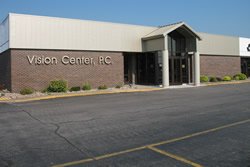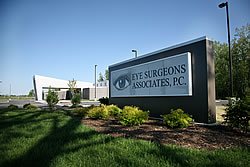AMD is the most common cause of visual loss in people over 50 years of age. It is a disease that affects the central (macular) portion of the retina. The macula is the area responsible for central (reading and distance) vision.
There are two main types of macular degeneration, “dry” and “wet”. The dry type is far more common and generally has a better prognosis because it progresses more slowly and is associated with better vision. In the dry type of macular degeneration, visual cells are gradually lost, and the fine central vision, including color vision deteriorates. The wet type of macular degeneration is associated with the growth of abnormal blood vessels under the retina, leakage, bleeding and eventual scarring. The visual loss with wet AMD is more rapid and usually more severe. The dry type of AMD can progress into the wet type. There is no treatment to reverse the damage of dry AMD. There are multiple treatments for wet AMD. Wet AMD can frequently be “dried-up” with stabilization or improvement of vision, but there is a high rate of recurrence.
Who’s at risk? A family history of AMD in a parent or sibling increases your risk by 4 to 5 times. Caucasians, blue-eyed people and women all have a higher risk. Controllable risk factors include high blood pressure, hyperlipidemia (high serum cholesterol or triglycerides), smoking, obesity and sunlight.
It is highly recommended that you have regular eye exams to detect AMD and other ocular diseases at the earliest possible stage. It is also important to monitor your vision at regular intervals (test one eye at a time). Any sudden changes in vision should be reported to your eye care professional immediately.
Michael Howcroft, MD, of Eye Surgeons Associates is board certified and a Retina Specialist. He specializes in the medical and surgical treatment of age-related macular degeneration, diabetic retinopathy, retinal vascular disease, retinal detachment, ocular trauma and ophthalmic ultrasound. For more information on AMD visit our web page https://www.eyesurgeonspc.com/bettendorf/macular-degeneration.htm
The material contained in this article is for informational purposes only and is not intended to be a substitute for professional medical advice, diagnosis, or treatment. Always seek the advice of your physician or other qualified health care provider.




